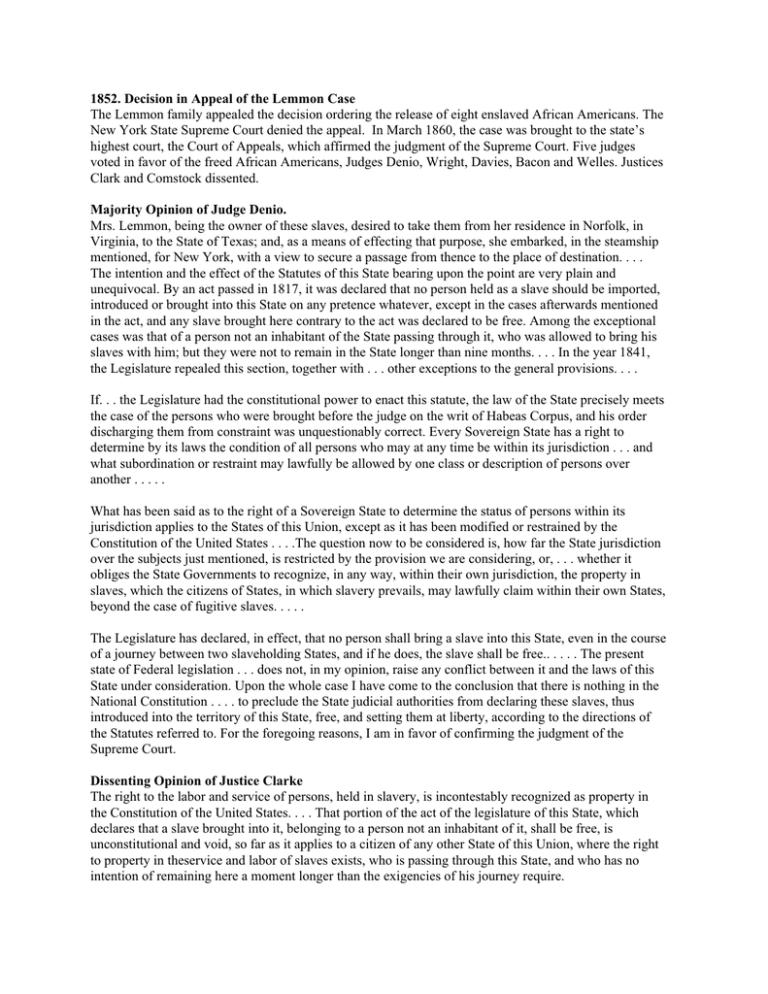1852. Decision in Appeal of the Lemmon Case
advertisement

1852. Decision in Appeal of the Lemmon Case The Lemmon family appealed the decision ordering the release of eight enslaved African Americans. The New York State Supreme Court denied the appeal. In March 1860, the case was brought to the state’s highest court, the Court of Appeals, which affirmed the judgment of the Supreme Court. Five judges voted in favor of the freed African Americans, Judges Denio, Wright, Davies, Bacon and Welles. Justices Clark and Comstock dissented. Majority Opinion of Judge Denio. Mrs. Lemmon, being the owner of these slaves, desired to take them from her residence in Norfolk, in Virginia, to the State of Texas; and, as a means of effecting that purpose, she embarked, in the steamship mentioned, for New York, with a view to secure a passage from thence to the place of destination. . . . The intention and the effect of the Statutes of this State bearing upon the point are very plain and unequivocal. By an act passed in 1817, it was declared that no person held as a slave should be imported, introduced or brought into this State on any pretence whatever, except in the cases afterwards mentioned in the act, and any slave brought here contrary to the act was declared to be free. Among the exceptional cases was that of a person not an inhabitant of the State passing through it, who was allowed to bring his slaves with him; but they were not to remain in the State longer than nine months. . . . In the year 1841, the Legislature repealed this section, together with . . . other exceptions to the general provisions. . . . If. . . the Legislature had the constitutional power to enact this statute, the law of the State precisely meets the case of the persons who were brought before the judge on the writ of Habeas Corpus, and his order discharging them from constraint was unquestionably correct. Every Sovereign State has a right to determine by its laws the condition of all persons who may at any time be within its jurisdiction . . . and what subordination or restraint may lawfully be allowed by one class or description of persons over another . . . . . What has been said as to the right of a Sovereign State to determine the status of persons within its jurisdiction applies to the States of this Union, except as it has been modified or restrained by the Constitution of the United States . . . .The question now to be considered is, how far the State jurisdiction over the subjects just mentioned, is restricted by the provision we are considering, or, . . . whether it obliges the State Governments to recognize, in any way, within their own jurisdiction, the property in slaves, which the citizens of States, in which slavery prevails, may lawfully claim within their own States, beyond the case of fugitive slaves. . . . . The Legislature has declared, in effect, that no person shall bring a slave into this State, even in the course of a journey between two slaveholding States, and if he does, the slave shall be free.. . . . . The present state of Federal legislation . . . does not, in my opinion, raise any conflict between it and the laws of this State under consideration. Upon the whole case I have come to the conclusion that there is nothing in the National Constitution . . . . to preclude the State judicial authorities from declaring these slaves, thus introduced into the territory of this State, free, and setting them at liberty, according to the directions of the Statutes referred to. For the foregoing reasons, I am in favor of confirming the judgment of the Supreme Court. Dissenting Opinion of Justice Clarke The right to the labor and service of persons, held in slavery, is incontestably recognized as property in the Constitution of the United States. . . . That portion of the act of the legislature of this State, which declares that a slave brought into it, belonging to a person not an inhabitant of it, shall be free, is unconstitutional and void, so far as it applies to a citizen of any other State of this Union, where the right to property in theservice and labor of slaves exists, who is passing through this State, and who has no intention of remaining here a moment longer than the exigencies of his journey require.




